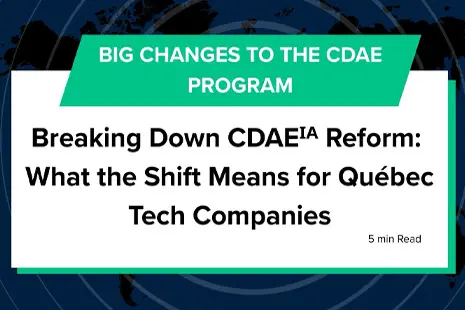While the recent interest rate cut by the US Fed gave some relief to concerns around lending and investment heading into 2025, recent reports show that CFOs are still largely anxious about their short- and long-term business prospects as 2024 comes to a wrap.
Much of this is rooted in political uncertainty, as a recent Deloitte poll found that 58 percent of CFOs view November’s US presidential election as “extremely or very consequentially” to their organizations, regardless of who takes office.
While this may not be altogether surprising—there are significant differences between each candidate’s stance on everything from taxes to global trade—the issues CFOs flagged as a top priority for the next administration show that financial leaders are concerned about business fundamentals (and not AI, despite what news coverage may indicate).
When asked “which issues should be a top priority for the government to address,” Deloitte respondents indicated:
- Workforce issues (33%)
- Outbound investment (26%)
- Supply chains (22%)
- AI regulation (195)
Digging deeper, while geopolitics (56 percent) and the economic environment (41 percent) were the top “areas of concern” that were most impactful to CFOs polled, trade policy and tariffs (39%) as well as corporate and individual tax policy (37%) were focus areas that continued to resonate across Deloitte’s research.
In fact, tax policy and tariffs (combined) were flagged as the top issues “affecting business operations” among 36 percent of Deloitte’s CFO respondents, topping inflations (34 percent), interest rates (20 percent) and even debt levels (11 percent).
The 2017 Tax Cuts and Jobs Act looms large as deadlines approach
Since 2017, the Tax Cuts and Jobs Act (TCJA) launched under the Trump Administration has also loomed large over the business community, as the measures therein reshaped the corporate tax landscape.
Key to these changes were transformational changes to how businesses can claim research and experimentation (R&E) expenditures under IRC Section 174.
Section 174 primer
Upon approval, the TCJA broadened the scope for what would qualify as R&E beginning in 2022, but significantly tightened how much companies can use R&E deductions to offset expenses. The most immediate result for many businesses was the creation of taxable income—even for some companies that had never recorded taxable income previously.
The revisions also outline separate requirements for R&E amortization (again, opposed to being used as a deduction for the year accrued) based on geography. For domestic R&E expenses, the amortization period was placed at 5 years, while foreign R&E investments must amortize over 15 years.
Going a step further, expenses are “placed in service” at the midpoint of the first year of amortization, making year-one deductions only roughly half of what they could be in following years.
While many steps have been taken and proposals pitched to backtrack some of the more damaging aspects of the TCJA since 2017, whoever takes office in 2025 will have a say on the future of the legislation and whether certain measures are extended (a probably outcome under Trump) or reversed, if not stricken down altogether (a potential move floated by the Harris campaign).
In total, 38 percent of CFOs flagged “expensing R&D expenditures” as the most impactful portion of the TCJA to their organization.
Interest rate cuts not enough to boost short-term economic outlook
While acknowledging that recent measures by the Fed are a positive sign, only 14 percent of the CFOs polled by Deloitte gave the US economy a positive rating.
To that end, only 19 percent of CFOs anticipated improvements to the larger North American economy by the end of 2025. This is a big reversal of fortunes, as the majority of CFOs who took part in Deloitte’s research in Q1 and Q2 had previously held a positive economic outlook.
The takeaway from Deloitte analysts was that a “recession is unavoidable,” according to CFOs in the know. But the fact of the matter remains that CFO attitudes are shifting markedly quarter-over-quarter, and changes to the political landscape have been moving just as fast and even more unpredictably (ie. there’s a new Democratic candidate angling for office in Q3 vs. Q2).
Driving innovation to bolster operations through a downturn
With workforce issues—including talent and upskilling—emerging as a top concern in this latest quarterly research, it’s important for CFOs to focus investment and efforts on areas of their operations that will deliver results without stretching budgets.
While concerns around Section 174 are valid, the federal R&D tax credit (Section 41) is still a robust tool that teams can tap into to cover a portion of the costs that go to creating market-leading products and services.
It’s also critical that teams leverage solutions that empower their existing teams to “work smarter,” instilling processes that unlock access to growth capital while also optimizing workflows for more effective R&D.
By aligning the key financial, payroll and workflow data necessary to paint a complete picture of your businesses R&D and product development—from time spent on specific individuals on specific projects, to active tracking of tax credit eligibility—teams can be more effective with the budgets they’ve already been given.
At Boast, we work with hundreds of innovative businesses across North America to maximize their access to growth capital while delivering powerful, actionable insights into their R&D to help build stronger products—and ultimately stronger businesses.
To learn more about how Boast can help teams maximize their R&D and access to innovation tax credits, talk to an expert today.
CFO Concerns FAQ
- What are the main concerns of CFOs heading into 2025? According to a Deloitte poll, CFOs are anxious about political uncertainty, with 58% viewing the upcoming US presidential election as highly consequential. Top priorities for government to address include workforce issues (33%), outbound investment (26%), supply chains (22%), and AI regulation (19%).
- How do tax policies and tariffs impact businesses currently? Tax policies and tariffs were flagged as the top issues affecting business operations by 36% of CFOs surveyed, surpassing concerns about inflation (34%), interest rates (20%), and debt levels (11%).
- What is the significance of the 2017 Tax Cuts and Jobs Act (TCJA) for businesses? The TCJA significantly changed how businesses can claim research and experimentation (R&E) expenditures under IRC Section 174. It broadened the scope of qualifying R&E but tightened how much companies can use R&E deductions to offset expenses. 38% of CFOs flagged “expensing R&D expenditures” as the most impactful portion of the TCJA to their organization.
- How do CFOs view the current economic outlook? Despite recent interest rate cuts, only 14% of CFOs gave the US economy a positive rating. Just 19% anticipated improvements to the North American economy by the end of 2025, a significant reversal from more optimistic outlooks in Q1 and Q2.
- What strategies are suggested for businesses to navigate potential economic challenges? The blog suggests focusing on areas that deliver results without stretching budgets. It recommends leveraging the federal R&D tax credit (Section 41) to cover product development costs. Additionally, it advises using solutions that empower existing teams to work more efficiently, such as aligning financial, payroll, and workflow data to optimize R&D processes and maximize access to growth capital.


